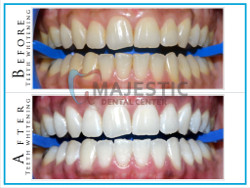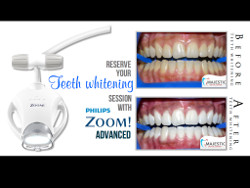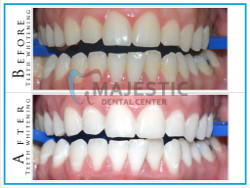
Teeth whitening
Dental bleaching, also known as tooth whitening is one of the most conservative and cost-effective dental treatments to improve or enhance a person’s smile.
The tooth whitening is either professionally applied (in the dental office) or dentist-prescribed/dispensed (patient home-use). Current tooth bleaching materials are based primarily on either hydrogen peroxide or carbamide peroxide. Both may change the inherent color of the teeth but for safety and efficacy, tooth bleaching is best performed under professional supervision.
The effects of bleaching can last for several months, but may vary depending on the lifestyle of the patient. Factors that decrease whitening include smoking and the ingestion of dark colored liquids like coffee, tea and red wine. Also results may vary depending on such factors as type of stain, age of patient, concentration of the active agent, and treatment time and frequency.


